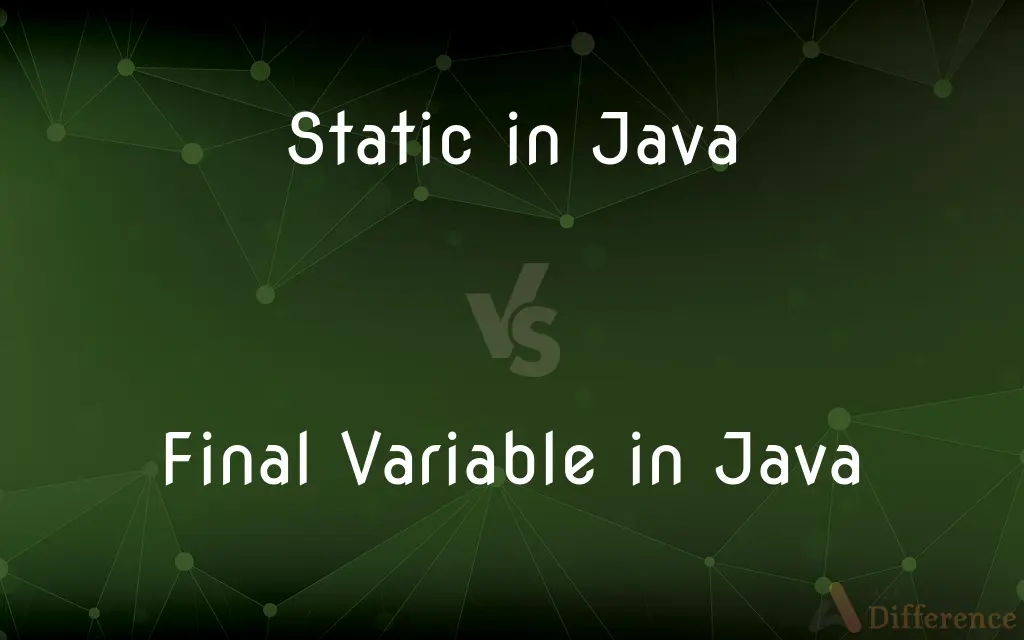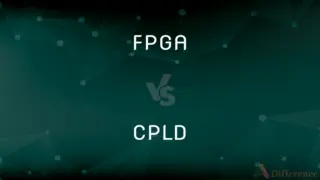Static in Java vs. Final Variable in Java — What's the Difference?
By Tayyaba Rehman — Published on January 3, 2024
Static in Java denotes a class-level variable or method; final indicates that a variable's value cannot be changed once initialized.

Difference Between Static in Java and Final Variable in Java
Table of Contents
ADVERTISEMENT
Key Differences
Static in Java refers to a variable or method that belongs to the class itself, rather than instances of the class. Any static member can be accessed directly using the class name without needing an object. In contrast, a final variable in Java signifies immutability. Once a final variable is assigned a value, it cannot be altered. This applies to both primitive data types and object references.
In the context of variables, static variables are initialized only once at the start of the execution and hold the same value for every instance of the class. On the flip side, a final variable must be initialized when it is declared or within the constructor of the class. While every instance can access a static variable with the same value, each instance can have its own copy of a final variable with potentially different values.
When used with methods, static means that the method belongs to the class and not to any specific instance, making it common for all instances. In contrast, there is no direct concept of a final method. Instead, final is used to prevent method overriding. When a method in a class is declared as final, it cannot be overridden by subclasses.
With classes, static is not applicable since classes themselves cannot be declared static; however, nested classes can be. A final class cannot be subclassed. This means once a class is designed and declared as final, it is immutable in terms of inheritance.
Static blocks or static initializers in Java are used for static member initialization and are executed once the class is loaded. In contrast, there is no such concept as a final block; the final keyword does not affect the initialization blocks but instead ensures that variables defined within those blocks adhere to the immutability contract if they are declared final.
ADVERTISEMENT
Comparison Chart
Scope
Belongs to the class; not tied to an instance.
Value cannot be changed once assigned; tied to the instance.
Initialization
Can be initialized in a static block; once per class.
Must be initialized when declared or in the constructor.
Memory Allocation
Memory allocated once in the class area at the time of class loading.
Memory allocated for each instance where it is declared.
Inheritance
Static methods cannot be overridden but can be hidden by subclasses.
Final variables do not influence inheritance; final methods prevent overriding.
Usage with Classes and Methods
Static classes and methods are used for utilities or common behaviors.
Final is not applicable to variables at the class level but finalizes classes and methods.
Compare with Definitions
Static in Java
A nested class that does not require a reference to its outer class.
Public static class NestedClassName { }
Final Variable in Java
A variable that is initialized with a value at compile time and is never changed.
Final double PI = 3.14159;
Static in Java
A method that can be called without an object of the class.
Public static void printClassName() { }
Final Variable in Java
An object reference that cannot be made to refer to a different object.
Final List UNMODIFIABLE_LIST = new ArrayList<>();
Static in Java
A variable that is shared among all instances of a class.
Static int countInstances;
Final Variable in Java
Parameters in a method that cannot be modified.
Public void connect(final String address) { }
Static in Java
Allows members (fields and methods) defined in a class as public static to be used without specifying the class in which the field is defined.
Import static java.lang.Math.PI;
Final Variable in Java
A primitive data type that, once initialized, cannot be altered.
Final int MAX_CONNECTIONS = 50;
Static in Java
A block of code that is executed at the time of class loading.
Static { countInstances = 0; }
Final Variable in Java
Instance or class fields that cannot be reassigned after construction.
Final Date birthDate;
Common Curiosities
Can static methods access instance variables?
No, static methods cannot access instance variables directly; they need an object reference.
What is a static block in Java?
A static block is a group of statements inside a Java class that is executed when the class is first loaded into memory.
Can a static method be overridden?
No, static methods cannot be overridden but can be hidden if the subclass has a method with the same signature.
Can a final variable be static?
Yes, a variable can be both static and final, meaning it's a constant at the class level.
Why use static variables in Java?
Static variables are used when you need a common property that should be shared with all instances of the class.
Does a final variable improve performance?
Yes, final variables can be inlined at compile time, potentially improving performance.
What does static mean in Java?
Static means the field or method belongs to the class, rather than an instance of the class.
Can a final method be inherited?
Yes, a final method can be inherited but cannot be overridden by subclasses.
Are final variables thread-safe?
Yes, final variables are inherently thread-safe once they have been assigned.
Can final variables be initialized later?
Yes, final instance variables can be initialized later, but only once, typically in the constructor.
Is it mandatory to initialize a final variable at the point of declaration?
No, but it must be initialized before the constructor completes, and it cannot be modified afterwards.
What is a final variable in Java?
A final variable in Java is a variable that can be assigned only once and its value cannot be changed.
What happens if I try to change the value of a final variable?
The Java compiler will throw a compilation error if you try to change the value of a final variable.
Can a final class contain static methods?
Yes, a final class can contain static methods.
Can a static variable be final?
Yes, a static variable can be declared final, and it would be a class-level constant.
Share Your Discovery

Previous Comparison
FPGA vs. CPLD
Next Comparison
Aerobic Glycolysis vs. Anaerobic GlycolysisAuthor Spotlight
Written by
Tayyaba RehmanTayyaba Rehman is a distinguished writer, currently serving as a primary contributor to askdifference.com. As a researcher in semantics and etymology, Tayyaba's passion for the complexity of languages and their distinctions has found a perfect home on the platform. Tayyaba delves into the intricacies of language, distinguishing between commonly confused words and phrases, thereby providing clarity for readers worldwide.












































